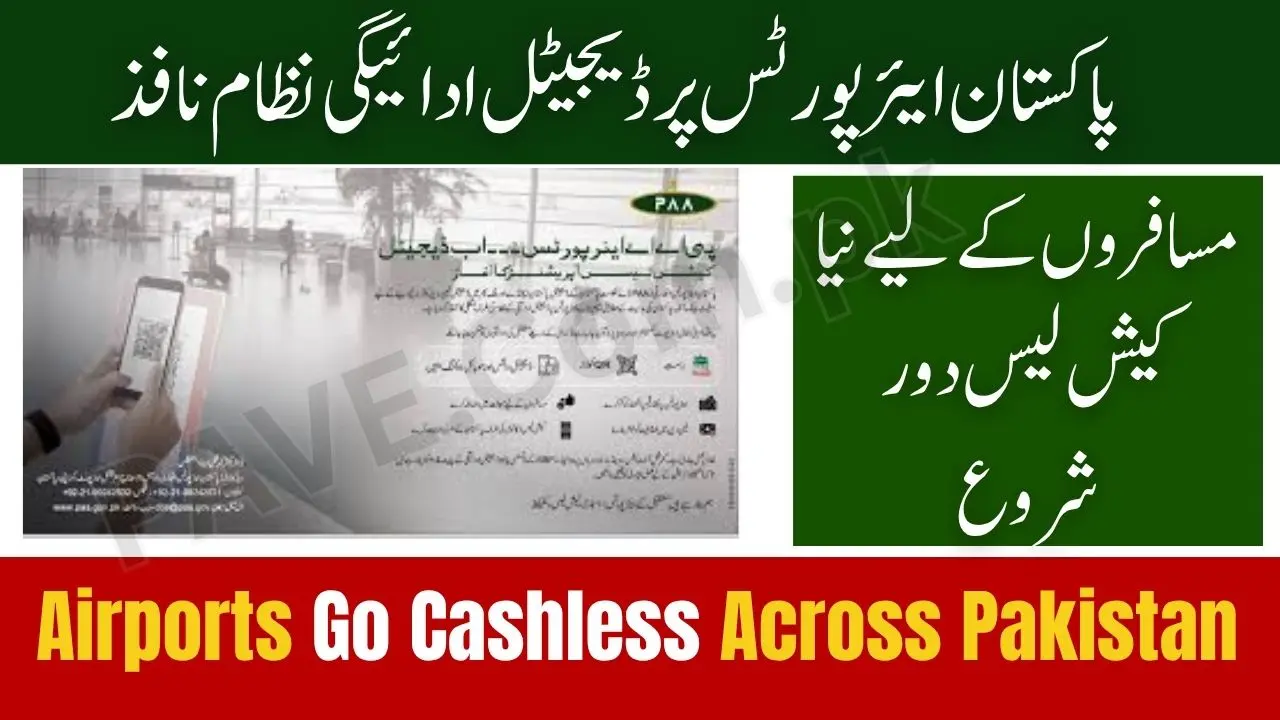Breaking News: Pakistan Airports Authority Implements Digital Payment System Nationwide — SBP Initiative for Cashless Airports

The Pakistan Airports Authority has officially begun implementing a digital payment system nationwide, marking a major milestone toward the government’s vision of a cashless economy. Acting under the directives of the State Bank of Pakistan (SBP) and the Federal Government, all commercial outlets and service providers at airports have been instructed to adopt digital and electronic payment solutions for their transactions.
Officials confirmed that this move is designed to improve passenger convenience, transparency, and modern financial governance across all airports in Pakistan — from Karachi and Lahore to Skardu and Gwadar.
Digital Transformation Under SBP’s Cashless Vision
The State Bank of Pakistan has been pushing for a comprehensive digital transformation in the country’s financial sector. With mobile banking, QR payments, and point-of-sale (POS) terminals becoming more common, the SBP is now extending this system to public infrastructure — especially airports, where thousands of transactions occur daily.
A senior official at Pakistan Airports Authority stated,
“The aim is to ensure that all payments made at airports — whether for parking, cafes, duty-free shops, or lounges — are traceable and efficient. This reform aligns with the State Bank’s cashless Pakistan initiative.”
The cashless airport model will eventually integrate with digital wallets, mobile banking apps, and card payments to ensure that passengers have multiple options available for quick, contactless transactions.
Check Also: Breaking News: Maryam Nawaz Announces 1908 Community Health Inspector Jobs in Lahore — Apply Now
Why Digital Payments at Airports Matter
Airports are high-traffic zones with hundreds of vendors and service providers — from restaurants to cab counters and baggage handlers. Most of these have traditionally relied on cash payments, leading to delays, record-keeping issues, and occasionally untraceable transactions.
By adopting digital systems, the Pakistan Airports Authority aims to:
- Reduce cash handling and the risk of mismanagement
- Ensure transparent financial reporting
- Facilitate foreign travelers through international card acceptance
- Improve operational efficiency for airport management
- Create a digital record that supports taxation and audit transparency
This also positions Pakistan alongside international best practices where cashless airports have become the new global norm, especially after the COVID-19 era.
How the New Digital Payment System Works
According to the new policy framework, every vendor, café, retail outlet, and service desk at Pakistani airports is required to integrate an SBP-approved digital payment method.
This includes:
- Debit and Credit Card Terminals (POS Machines)
- QR Code-Based Payments (Raast, Easypaisa, JazzCash, NayaPay)
- Online Payment Gateways for Bookings and Pre-Paid Services
- Bank Transfers and Mobile Wallets
Airport management teams have already begun awareness sessions with vendors and commercial partners to ensure seamless integration.
Step-By-Step Implementation Plan
| Phase | Activity | Timeline |
|---|---|---|
| Phase 1 | Vendor registration and onboarding | October–November 2025 |
| Phase 2 | Integration of POS & Raast QR payments | December 2025 |
| Phase 3 | Public awareness campaign for travelers | January 2026 |
| Phase 4 | Full operationalization and monitoring | February 2026 |
During the initial phase, both cash and digital modes will remain operational; however, vendors will be encouraged to prioritize digital options to ensure smooth transition.
Check Also: CM Maryam Nawaz Launches Olive Oil Scheme 2025 — 50% Subsidy for Extraction Units in Punjab
Passenger Benefits of the Digital Payment System
The new system brings major benefits for domestic and international travelers.
Here’s a quick look at how this initiative enhances passenger experience:
| Benefit | Details |
|---|---|
| Ease of Payment | Passengers can pay using cards, QR codes, or mobile wallets instantly. |
| Transparency | Every transaction is digitally recorded, reducing the risk of overcharging or fraud. |
| Speed | Digital transactions are faster than cash exchanges, cutting waiting times at counters. |
| Currency Flexibility | Foreign travelers can use international debit/credit cards directly. |
| Receipts and Record | E-receipts allow easy record-keeping and refund claims. |
| Safety | Less cash handling reduces theft and hygiene concerns. |
Support from State Bank and Government of Pakistan
The State Bank of Pakistan has been advocating for the Raast Instant Payment System, enabling users to make direct bank-to-bank payments in seconds. With airports now part of this network, Pakistan moves one step closer to a truly digital economy.
Finance Ministry officials mentioned that this system will also help in tax documentation, anti-money laundering compliance, and consumer protection. The SBP, in collaboration with commercial banks, is assisting airport vendors in installing and maintaining the necessary payment infrastructure.
The Ministry of Information Technology & Telecommunication has also pledged support, providing cybersecurity and data protection frameworks for safe online transactions.
Business Impact on Airport Vendors
While some small vendors initially expressed concern about the costs of adopting POS systems, officials clarified that SBP and banks are offering subsidized rates for digital terminals and QR code solutions.
The move will actually boost vendor sales because passengers increasingly prefer cashless options. International travelers, in particular, find it easier to make purchases digitally instead of carrying Pakistani rupees.
One restaurant owner at Islamabad Airport said:
“Most customers now pay through cards or Raast. It’s faster and more secure for both sides.”
Digital Pakistan Vision and Cashless Future
The digitalization of airports aligns with the government’s broader Digital Pakistan Vision, which focuses on e-governance, fintech innovation, and paperless transactions. The National Digital Payment Strategy 2025 already targets a 50% reduction in cash usage across the economy.
With this airport reform, Pakistan takes a major leap toward that milestone. Officials confirmed that by mid-2026, all major airports — including Lahore, Karachi, Islamabad, Multan, Faisalabad, and Peshawar — will operate fully cashless environments.
Next Steps in the Digital Expansion
- Integration with E-Gate and E-Visa fee systems
- Connection with NADRA digital ID for traveler verification
- Expansion to airport parking and transport services
- Pilot for automated vending and ticketing using Raast QR codes
Public Response and Expert Opinion
Travelers have generally welcomed the decision. Many social media users praised the government for introducing long-awaited modernization in airport management. Experts say that Pakistan’s aviation system is now aligning with global standards where contactless and traceable payments are part of everyday travel experience.
Economists also believe that digitizing transactions in public hubs like airports helps strengthen financial discipline, reduce tax evasion, and promote inclusive banking.
Challenges and Future Prospects
Like any digital reform, the system faces challenges such as:
- Connectivity issues at remote airports
- Lack of awareness among small vendors
- Cybersecurity concerns
- Need for uniform policy enforcement
However, with SBP’s monitoring and technical assistance, these challenges are expected to be resolved during the rollout phase.
Authorities also hinted that similar systems will soon be introduced in railway stations, bus terminals, and motorway rest areas, promoting a fully integrated cashless public service ecosystem.
FAQs about Digital Payment System at Pakistan Airports:
1. What is the purpose of the digital payment system at airports?
It aims to ensure transparent, quick, and cashless transactions for passengers and vendors.
2. Who ordered the implementation?
The directive was issued by the State Bank of Pakistan and supported by the Federal Government.
3. Will cash payments still be allowed?
Yes, temporarily — but vendors are encouraged to prioritize digital payments.
4. Which digital methods are accepted?
POS machines, QR payments (Raast, JazzCash, Easypaisa), debit/credit cards, and mobile wallets.
5. Does this affect airport parking or lounges?
Yes, all commercial and service units including parking and lounges are included.
Conclusion – Pakistan Airports Authority Implements Digital Payment System Nationwide
The Pakistan Airports Authority’s implementation of a nationwide digital payment system marks a historic step toward modernization. Under the guidance of the State Bank of Pakistan, this initiative will transform how financial transactions occur in one of the country’s most critical sectors — air travel.
As Pakistan moves toward a cashless economy, this reform not only promotes efficiency and transparency but also strengthens the country’s digital infrastructure, paving the way for a smarter, safer, and more connected future for travelers and businesses alike.





